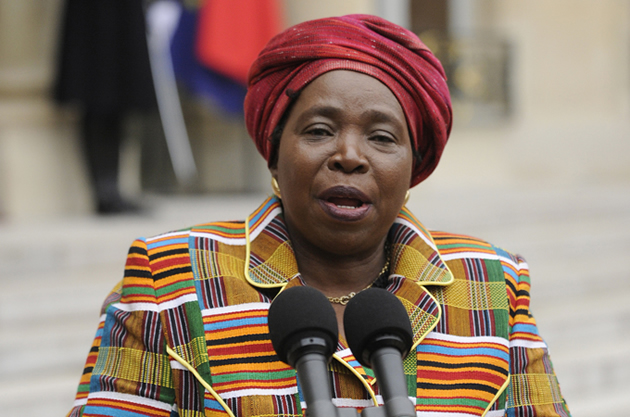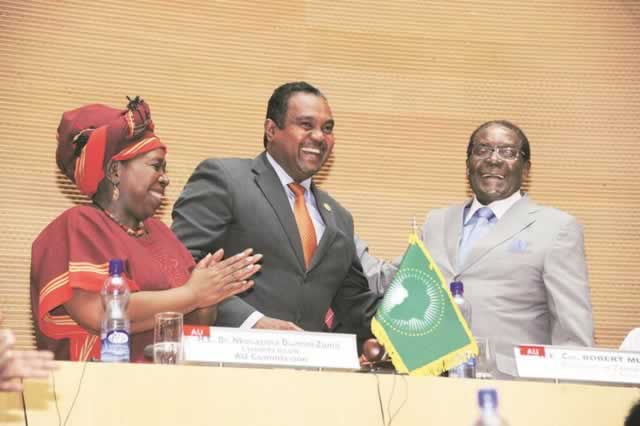AU, Dlamini-Zuma and Vision 2063

Dlamini-Zuma’s Vision 2063, an action plan towards an ideal Africa, is one of her legacy projects.
Correspondents
African Union Commission chairperson Dr Nkosazana Dlamini-Zuma may not enjoy the warmest love from Francophone Africa, which resisted her rise in 2012, and ironically, her native South Africa.
However, her oversight of the crafting of the Vision 2063 blueprint ranks as one of her biggest legacies at the continental body. Vision 2063 is a transformative programme that will impact on the AU and individual African countries.
In between, the AU Commission has a widely disseminated strategic plan covering the period 2014 to 2017.
As Dlamini-Zuma states in the preface to this document: “The plan constitutes the framework that outlines the overall priorities of the commission for the four-year period, and provides guidance for programme formulation and prioritisation. It provides space for [the AU Commission] to play its facilitating role, especially with respect to policy and strategy setting, coordination and catalysing Africa’s socioeconomic and integration agenda, consensus-building and advocacy, experience and information-sharing. It seeks to establish the basis for creating the continental public good and the enabling conditions necessary for peace, security, political stability and growth.” Who says the AU Commission under Dlamini-Zuma has no clear strategy?
The AU has responded fairly well to recent crises in Africa, from the Ebola outbreak and Boko Haram, to Burkina Faso and South Sudan. Ongoing crises like those in Libya, Somalia and the Great Lakes region continue to receive priority attention through peacemaking efforts.
On the issue of staff, there is not an iota of truth in what is claimed in the article.
Each member state has a quota on staffing at the headquarters, which protects the AU from being overwhelmed by one state. In the case of the AU Commission, the chairperson’s office staff comprises advisers, personal assistants, protocol support, security and so forth.
Immediately outside her office is the deputy chairperson and further on are the eight commissioners with their well-staffed directorates. The AU chief of staff is from Burkina Faso and none of the commissioners, nor their directors, is South African. South Africans have historically and to date been thinly represented in the directorates. Besides a handful of advisers and personal support staff in the chairperson’s office, other team members are from various regions in Africa. It’s an exaggeration, and a gross one, to suggest that Dlamini-Zuma has employed too many South Africans at the commission.
Dlamini-Zuma is working as part of a team, not as a lone soldier on a messianic salvation mission of our continent.
Adios, Madame Dhlamini-Zuma?
The big news at the African Union (AU) was not the drama around Zimbabwean president Robert Mugabe’s ascent to the top position of AU chairperson, but talk that its administrative unit may have a new head by next year. Speculation is raging that AU Commission chairperson Nkosazana Dlamini-Zuma might not return for a second term.
Come 2016, and Nkosazana Dlamini-Zuma could be heading back to South Africa following a four-year AU stint.
Talk in and around the AU headquarters in Addis Ababa, Ethiopia, by diplomats and media attending this week’s summit, was that she would not lobby for a second term when her time is up next year.
The name of a possible successor, Algerian foreign minister and former AU commissioner Ramtane Lamamra, has been mentioned, an observer who works closely with the AU, said. It is still early days — after this summit, there are two more before the AU Commission chair is elected in the middle of next year — but Lamamra appears to be a strong candidate. He is well respected, experienced and from the francophone bloc, a lobby group that opposed Dlamini-Zuma’s election.
Convention also has it that the chairpersonship alternates between the anglophone and francophone countries.
But Dlamini-Zuma has refused to give any indication of what she will do.
A source close to Dlamini-Zuma said she was very difficult to read and “you cannot even speculate on this. She takes things one day at a time.” On at least two occasions, when asked whether she would leave the AU to run for ANC president, Dlamini-Zuma refused to comment. Even as there is uncertainty over whether she will stay or go, francophone countries already seem to have agreed on Lamamra as their candidate. They have lobbied quietly for him at the summit. Exchanging the dusty Ethiopian capital’s injera (a pancake-like flatbread made with teff flour) and thin air for South Africa’s pap and relative lushness is unlikely to be seen as a tragedy for Dlamini-Zuma.
In an interview a year ago, she appeared a little homesick (Addis was until recently considered a diplomatic hardship posting) and, at the time, there was strong talk of the possibility of her making a bid for the ANC presidency in 2017.
Although she has been efficient in improving systems and ensuring meetings start on time, Dlamini-Zuma has done little to endear herself to her colleagues in the AU. Her election in 2012 followed an acrimonious bout of lobbying and critics felt she could have done more to heal the subsequent rifts. During her opening statement at the AU assembly this year, for instance, she spoke in English and Swahili only and failed to make an effort to communicate in French or Portuguese as a gesture of conciliation. Critics have also accused her of appointing too many South Africans around her at the AU headquarters, which has about 700 staff members.
Some of her challenges at the AU include getting member countries to make contributions – so that the union relies less on donor funding – and pushing a development agenda instead of conflict resolution (which has made her some enemies).
Dlamini-Zuma’s Vision 2063, an action plan towards an ideal Africa, is one of her legacy projects. Sadly, it might not bear enough fruit in the short-term to keep the momentum — and could well end when her term does next year. — City Press.









Comments